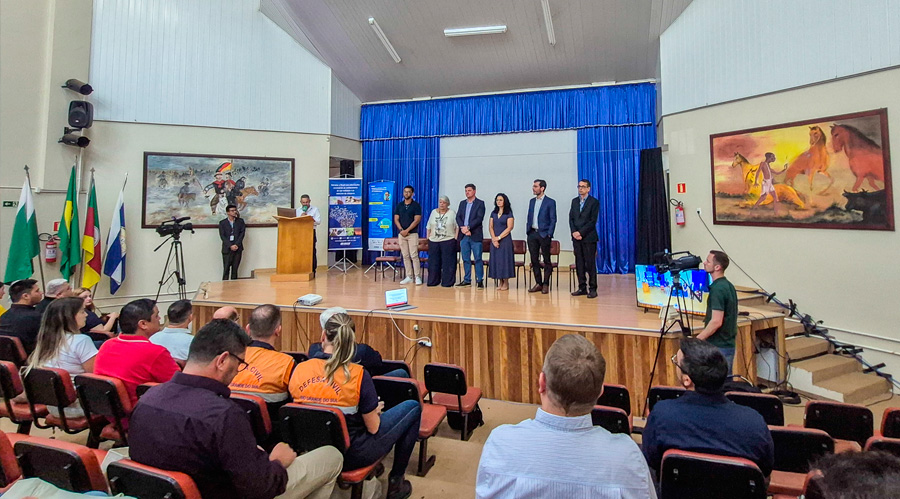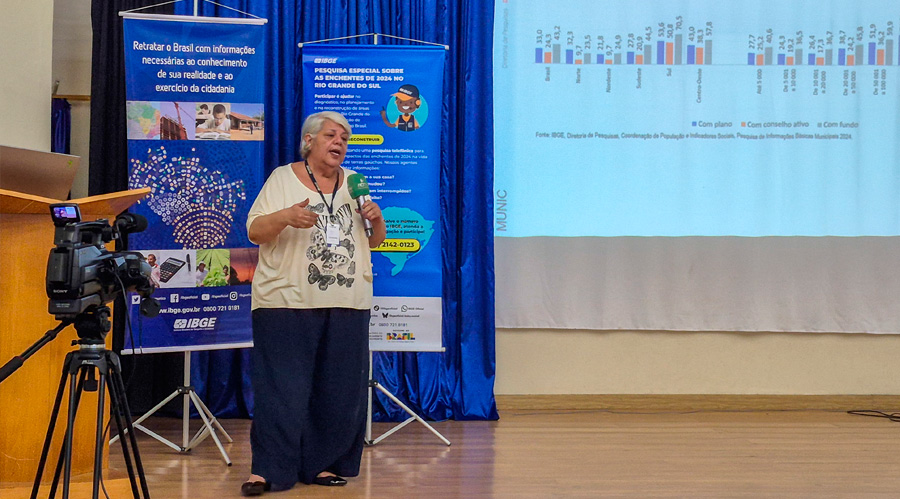MUNIC
In Rio Grande do Sul, IBGE presents MUNIC results on the storm of 2024
November 11, 2025 01h04 PM | Last Updated: November 12, 2025 02h36 PM

The Brazilian Institute of Geography and Statistics presented on Monday (10), in Seberi (RS), the results of the 2024 Municipal Basic Information Surveys (MUNIC) and State Basic Information Surveys (Estadic). The event took place at the auditorium of school Instituto Estadual de Educação Madre Tereza, with the support of the Association of Municipalities of the Production Zone (Amzop). The focus was on the MUNIC thematic section on climatic event storm in Rio Grande do Sul, with data collected from the municipalities of the stes. The presentation was streamed on Digital IBGE.
Every year, MUNIC and Estadic analyze the political-institutional structure of municipal and state governments, respectively. In 2024, in Rio Grande do Sul, MUNIC included aspects such as affected cities, warning systems and emergency plans of the municipalities. The survey has shown that rainfall between April and May reached 92.4% of the municipalities in the state, with significant social and economic impacts.
The event was attended by the general coordinator of the IBGE's Center for Information Documentation and Dissemination, José Daniel Castro da Silva; the deputy director of Surveys, Vladimir Miranda; the manager of Social Studies and Surveys, Vânia Pacheco; the researcher from the IBGE's Directorate of Geosciences, Higor Lopes Barcelos; and the acting superintendent of the IBGE in Rio Grande do Sul, Luís Eduardo Puchalski, as well as IBGE employees and guests.
Also attending the opening ceremony were local authorities, such as the mayor of Seberi and president of Amzop, Adilson Adam Balestrin. He highlighted the importance of the survey. “Those who are following along are able to connect with important data, which are tools to be used by the public and private sectors and that help make a difference in building better municipalities, a better state, and a better Brazil.”
The manager of Social Studies and Surveys, Vânia Pacheco, who presented the results, explained that the thematic sectionof MUNIC was dedicated to the measures and actions that the municipalities took during the storm climatic event, to the dimensioning of this event in the municipalities that faced it, and to the ways the situation was managed. "This is information from a very recent past, and a past that needs to serve as a lesson for what we may have ahead of us," she warned, emphasizing the need for governmental instruments for planning, organizing, and managing disaster risk.

The coordinator of the IBGE's Center for Information Documentation and Dissemination, José Daniel Castro da Silva, recalled that the IBGE has remained close to the people of Rio Grande do Sul since the beginning of the storm. "We created the Singed Lab, a virtual laboratory that served more than 220 municipalities in Rio Grande do Sul, and we expedited the release of data from the National Address List for Statistical Purposes to assist, among other things, in the distribution of resources to municipalities and people."
The IBGE's Deputy Director of Surveys, Vladimir Miranda, emphasized that the Institute, in the face of extreme weather events, has been trying to provide a rapid response to society from different perspectives. In this effort, he requested the collaboration of the people of Rio Grande do Sul for the success of the Special Survey on the 2024 Floods in Rio Grande do Sul(PEERS), whose data will keep being collected until the end of 2025.
The acting superintendent of the IBGE in Rio Grande do Sul, Luís Eduardo Puchalski, stated that a partnership between IBGE and the population is necessary for the survey to be successful. "We are currently conducting PEERS, a new household survey, not only to listen to the municipalities, like in MUNIC, but to listen to the people, how their lives have been impacted, and how life is now a year and a few months after the floods," explained Puchalski.
Rain in 2024 caused strong social and economic impacts
The Survey of Basic Mu nicipal Information (MUNIC), which in its 2024 edition implemented a specific section for municipalities in Rio Grande do Sul, showed the strength of the climatic event that hit the state.
In addition to the special chapter on the storm, the survey investigated eight other themes in the 5,570 Brazilian municipalities: human resources; information technology and communication; governance; housing; transportation and urban mobility; agriculture; migration management instruments and, for the first time, racial equality. Learn more about MUNIC 2024 here.




















